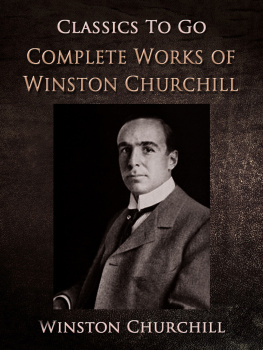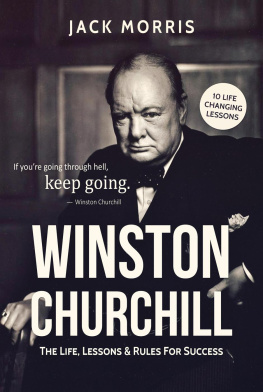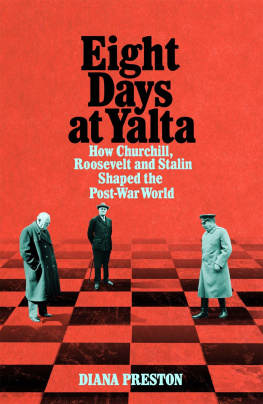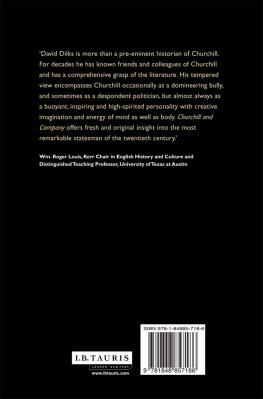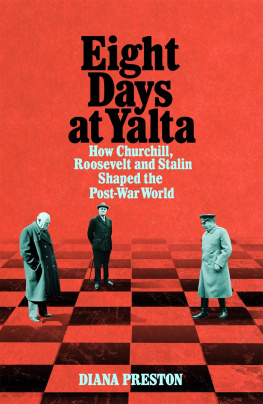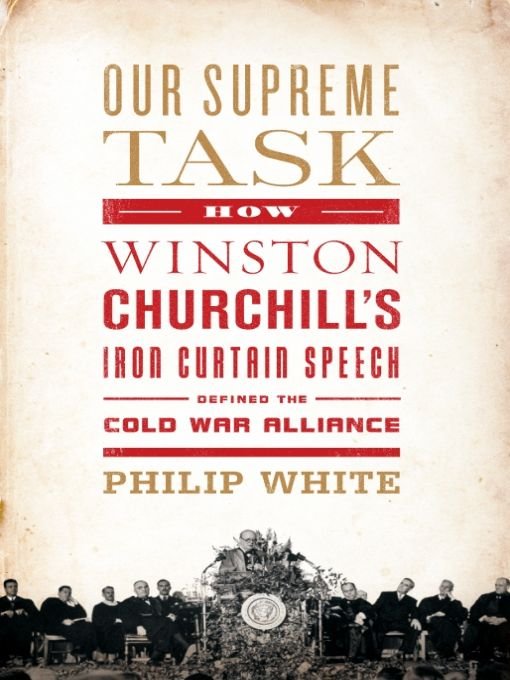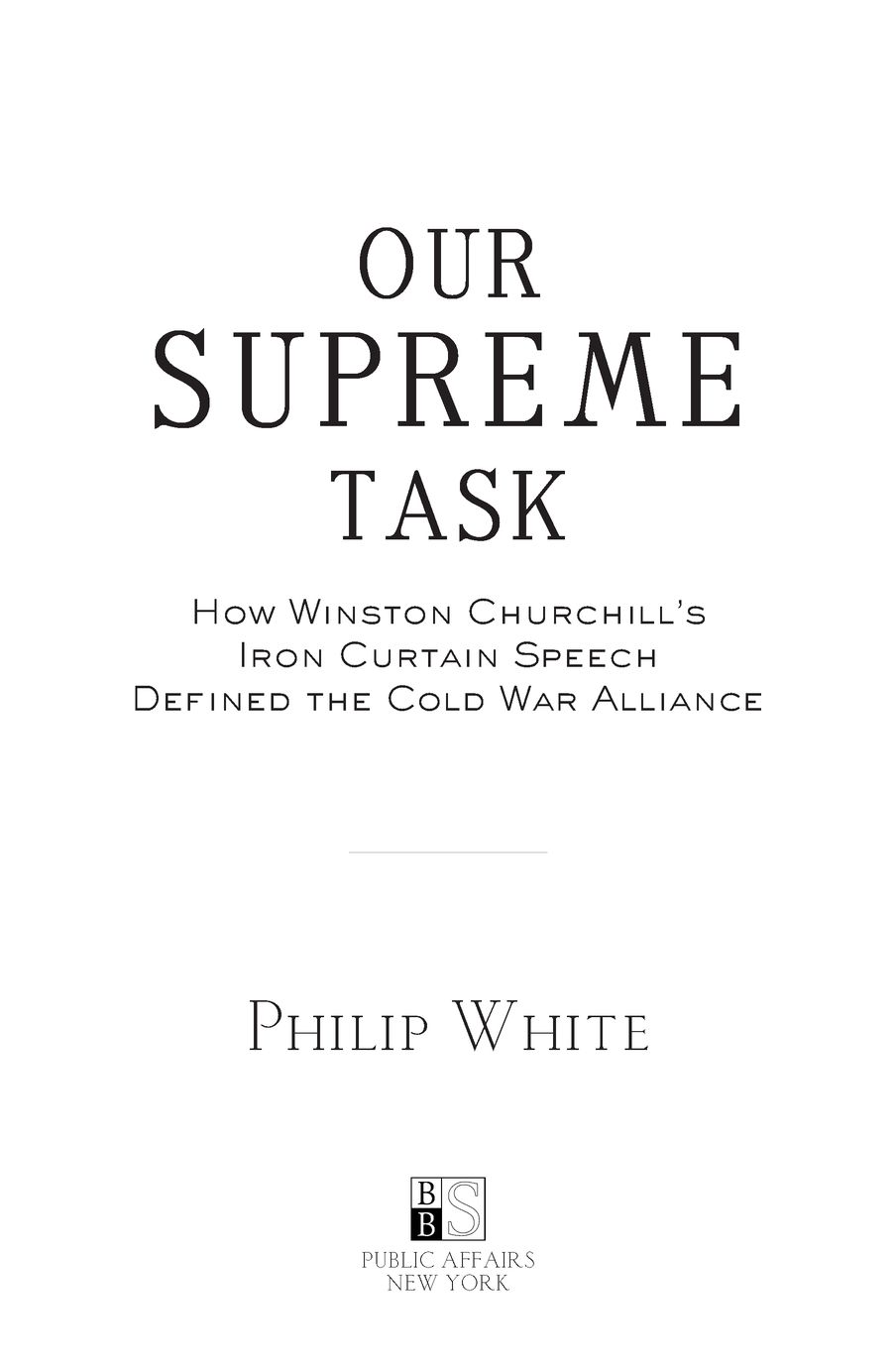Table of Contents
For Nicole, Nan, Johnny & Harry
INTRODUCTION
PICTURE WINSTON CHURCHILL on May 8, 1945. He stands on a London balcony on a warm spring afternoon, holding aloft his celebratory V sign to thousands of people cheering his name in the streets below. Against all odds, he had kept Britain in the fight against Hitler until the United States entered World War II, and now, five arduous years after becoming prime minister, he had finally vanquished his foe. Yet, just weeks later, his victory would be soured by a tumultuous General Election, a fearsome battle of wills with Russian premier Joseph Stalin, and the continued spread of Communism across Eastern Europe and beyond.
Though the celebratory scenes of early May stick in the memory, it was Churchills collision with Communism in the early postwar years that set the course for the remainder of his career, defined the divisions of the Cold War, and, ultimately, inspired Thatcher, Gorbachev, and Reagan to settle their nations differences through diplomacy instead of armed conflict.
Churchills strong reaction against Communism dated back to the Russian Revolution in 1917, when he scornfully labeled Bolshevism a pestilence. In The Aftermath, the final book of his World War I series, he attacked Lenin, who repudiated God, King, Country, morals, treaties, debts, rents, interest, the laws and customs of centuries, all contracts written or implied, the whole structure... of human society.
Churchill deplored everything about Communism. He had devoted his life to the preservation of democracy, and so was revolted by a totalitarianism under which individual liberty was subjugated and freedom constrained. In addition, having been born in Blenheim Palace into a noble lineage going back to the first Duke of Marlborough, he was an ardent monarchist who his wife would later call Monarchial No. 1. Thus, the Bolsheviks horrified Churchill when they wiped out the Russian ruling family in the course of their revolution.
Moreover, Churchill firmly believed in the virtues of capitalism, because he felt it provided the individual the best chance to prosper while affording industry the opportunity to advance his beloved Britain in international trade. In Leninist and then Stalinist Russia, the economic system was throttled and replaced by collectivization, which sought to eliminate the entrepreneurship, competition, and potential for growth that Churchill supported.
In his capacity as Minister of Munitions during World War I, Churchill had pressed British Prime Minister David Lloyd George to bolster the small Allied force that supported anti-Bolsheviks. The premier and Churchill went back and forth on the issue for several months, until President Woodrow Wilson finally vetoed the plan.
During the twenty-year interwar period, Churchill turned his attention first to domestic affairs and then, while out of office in the middle to late 1930s, to the imminent danger posed by Hitler. In no way did he ignore the ills of Communism, however, and he criticized Russias collectivization and suppression of individual liberties in numerous opinion pieces. Still, Churchill did not claim to have all the answers. It is a riddle, wrapped in a mystery, inside an enigma he famously said of Stalins homeland in a radio address in October 1939, but perhaps there is a key. That key is Russian national interest.
The Molotov-Ribbentrop nonaggression pact of August 1940, which bound the fates of Germany and Russia, had infuriated Churchill. Yet soon enough, Hitlers fateful decision to break his alliance with Stalin and declare war on Russia on June 22, 1941 (a decision that Churchill had predicted and tried to warn Stalin about the previous year), changed everything.
Of course, dissolution of the Russo-German accord had put Churchill in an awkward position. Staunchly opposed to Communism, he nonetheless accepted Stalin as an ally. The Red Armys engagement of Hitlers troops on the Eastern Front, after all, diverted manpower away from the German advance in Western Europe. And so, though Russia was far from his partner of choice, Churchill acknowledged that supporting Stalin was necessary to win the peace.
For all the conflicting ideological interests of the three Allied powers, there had seemed to be a breakthrough at Yalta in February 1945, when Churchill, Stalin, and Roosevelt signed a declaration of postwar aims, including a guarantee of free elections in Poland and other Eastern European countries. Shortly after the conference, Churchill told Canadian Prime Minister Mackenzie King that he thought Stalin would honor their gentlemens agreement: Personally, in spite of my anti-Communist convictions, I have good hopes that Russia, or at any rate Stalin, desires to work in harmony with the Western democracies.
As 1945 progressed, however, it became clear to Churchill and Roosevelt (and, later, Truman) that Stalin had no intention of honoring the Yalta Declaration, and that puppet Communist governments would soon roll over Eastern Europe. Even as Churchill declared faith in Stalin to Mackenzie King, Stalins ruthless Deputy Commissar for Foreign Affairs (and the former Grand Prosecutor who oversaw countless deaths in Stalins purges), Andrey Vishinsky, was leading Soviet forces in the takeover of Bucharest.
The Soviet monopolization of Eastern Europe was now virtually complete, and Churchill would soon discover the full extent of Stalins treachery. Just days after the Red Army marched across Romania, Churchill found out that Russias alternative to free elections was the nomination of solely its own chosen apparatchiks for government positions. Stalin later agreed to broaden the government to include the prewar Polish leaders then sheltering in London, only to renege soon after. Meanwhile, Churchill learned that Polish intellectuals and priests had been sent to Soviet labor camps and six thousand Polish soldiers were arrested and sentenced, though there was no court hearing or potential for appeal.
On March 8, 1945, Churchill sent a memo to Roosevelt saying that Stalin had deceived Britain and America. Just as he had done when facing down Hitler, Churchill courted the support of his American counterpart. And just as in the early phases of the war, Roosevelt proved reluctant to put his full weight behind the forceful Britons proposals, which included delaying the withdrawal of American troops once Hitler met his fate. This inertia is partly attributable to the idealistically favorable impression of Russia in the United States at that timean impression that failed to take into account the privations enforced by Communism.
Whatever hope Churchill had in Roosevelt as a foil to Stalin was dashed by the presidents death on April 12. Churchill knew only a little about the man who replaced FDR, Vice President Harry S. Truman. Still, the prime minister realized the necessityboth for successfully concluding the war and for securing Britains prominent place in peacetimeof cultivating a friendship with this brusque, untested Missouri native.
Twelve days into May, Churchill sent a telegram to Truman stating boldly that [a]n iron curtain is drawn down upon their [Russias] front, and I do not know what is going on behind. He called attention to Stalins flagrant violations of the Yalta Declaration, and warned that after the Muscovite advance into the centre of Europe... the curtain will descend again to a very large extent, if not entirely. Thus a broad band of hundreds of miles of Russian-occupied territory will isolate us from Poland. To further explain his views on Russia and to advance the personal diplomacy in which he placed so much stock, Churchill needed to meet Truman. He would get his chance at the final wartime summit at Potsdam, Germany, in July.


